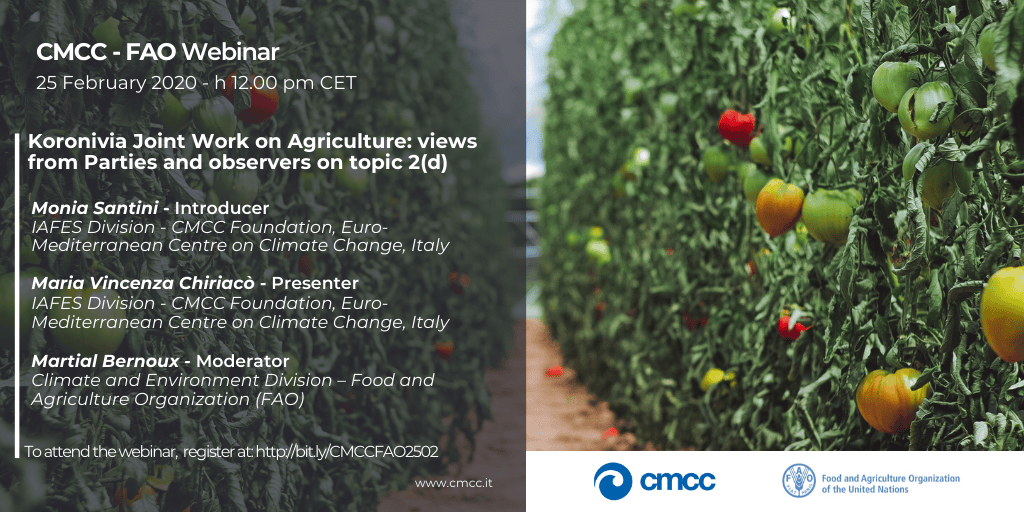CMCC-FAO Webinar | 25 February, 2020 – h. 12:00 – 1:00 PM CET
Introduced by: Monia Santini, Euro-Mediterranean Centre on Climate Change Foundation (CMCC – IAFES division), Italy
Speaker: Maria Vincenza Chiriacò, Euro-Mediterranean Centre on Climate Change Foundation (CMCC – IAFES division), Italy
Moderator: Martial Bernoux, Natural Resources Officer in Climate and Environment Division at Food and Agriculture Organization (FAO)

The historic Koronivia Joint Work on Agriculture (KJWA) decision, adopted at COP 23, recognizes the fundamental importance of agriculture in tackling climate change. The KJWA calls for joint work between the Subsidiary Body for Scientific and Technological Advise (SABSTA) and the Subsidiary Body of Implementation (SBI) with the aim to take into consideration the vulnerabilities of agriculture to climate change and approaches to address food security.
Paragraph 2 of the KJWA decision provides a list of initial elements on which Parties and observers to the UNFCCC were invited to submit their views:
(a) Modalities for implementation of the outcomes of the five in-session workshops on issues related to agriculture and other future topics that may arise from this work;
(b) Methods and approaches for assessing adaptation,adaptation co-benefits and resilience;
(c) Improved soil carbon, soil health and soil fertility under grassland and cropland as well as integrated systems, including water management;
(d) Improved nutrient use and manure management towards sustainable and resilient agricultural systems;
(e) Improved livestock management systems;
(f) Socioeconomic and food security dimensions of climate change in the agricultural sector.
FAO in collaboration with CMCC supported by the German Federal Ministry for Food and Agriculture (BMEL) is producing a summary of the submissions provided by Parties and observers to the UNFCCC on the topic 2(d) –Improved nutrient use and manure management towards sustainable and resilient agricultural systems. This topic was discussed during the SABSTA 51 (Madrid, December 2019). The summary aims to make the wide range of views submitted more easily accessible to all interested stakeholders and to support efforts to formulate a “no regret option” for climate action in the agricultural sectors.
AGENDA
12:00 pm – Welcome – Monia Santini (CMCC)
12.05 pm – Intro from the moderator – Martial Bernoux (FAO)
12:10 pm – Presenter’s talk – Maria Vincenza Chiriacò (CMCC)
12:30 pm – Q&A moderated by FAO – Martial Bernoux (FAO)
12:50 pm – End of Webinar
Working language: English
Speaker’s bio:
Martial Bernoux, Natural Resources Officer inClimate and Environment Division at Food and Agriculture Organization (FAO). Mr Bernoux is coordinating the Mitigation of Climate Change in Agriculture (MICCA) Programme at FAO since October 2015. He is a former high level scientist working for the French Research Institute for Development (IRD)with more than 200 research papers, books and chapters. He led research projects in South America and Africa for 20 years. Mr Bernoux has a strong experience of UNFCCC and UNCDD (a member of its Science-Policy Interface). Collaborates with IPCC since 2002. Before joining Climate and Environment Division, he worked from 2009 as developer of the FAO Ex-Ante Carbon-balance Tool (EX-ACT).
Watch the video:
How to participate
The seminar will be broadcasted via Go-to-Webinar.
Please, click on the following link for registration:
https://register.gotowebinar.com/register/5444716014646888194
Organized by
CMCC – Euro-Mediterranean Centre on Climate Change Foundation
FAO – Climate and Environment Division (CBC)
Under the project “Supporting Implementation of the Koronivia joint work on agriculture roadmap” supported by the German Federal Ministry for Food and Agriculture (BMEL).
Contacts

